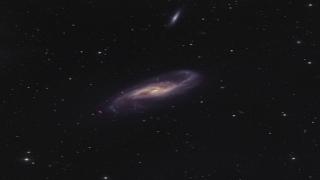Bibcode
Dullo, B. T.; Knapen, J. H.; Baldi, R. D.; Williams, D. R. A.; Beswick, R. J.; McHardy, I. M.; Green, D. A.; Gil de Paz, A.; Aalto, S.; Alberdi, A.; Argo, M. K.; Gallagher, J. S.; Klöckner, H. -R.; Marcaide, J. M.; Mutie, I. M.; Saikia, D. J.; Saikia, P.; Stevens, I. R.; Torrejón, S.
Referencia bibliográfica
Monthly Notices of the Royal Astronomical Society
Fecha de publicación:
8
2024
Número de citas
3
Número de citas referidas
2
Descripción
The relation between nuclear star clusters (NSCs) and the growth of the central supermassive black holes (SMBHs), as well as their connection to the properties of the host galaxies, is crucial for understanding the evolution of galaxies. Recent observations have revealed that about 10 per cent of nucleated galaxies host hybrid nuclei, consisting of both NSCs and accreting SMBHs that power active galactic nuclei (AGNs). Motivated by the potential of the recently published multiwavelength data sets from LeMMINGs survey, here we present the most thorough investigation to date of the incidence of hybrid nuclei in a large sample of 100 nearby nucleated galaxies (10 E, 25 S0, 63 S, and 2 Irr), covering a wide range in stellar mass ($M_{*,\rm gal} \sim 10^{8.7}-10^{12}~\rm M_{\odot }$). We identify the nuclei and derive their properties by performing detailed 1D and 2D multicomponent decompositions of the optical and near-infrared HST stellar light distributions of the galaxies using Sérsic and core-Sérsic models. Our AGN diagnostics are based on homogeneously derived nuclear 1.5 GHz e-MERLIN radio, Chandra X-ray (0.3-10 keV), and optical emission-line data. We determine the nucleation fraction ($f_{\rm nuc}$) as the relative incidence of nuclei across the LeMMINGs HST sample and find $f_{\rm nuc} =~$100/149 (= 67 $\pm$ 7 per cent), confirming previous work, with a peak value of $49/56~(= 88 \pm 13$ per cent) at bulge masses $M_{*,\rm bulge}\sim 10^{9.4}- 10^{10.8}~ \rm M_{\odot }$. We identify 30 nucleated LeMMINGs galaxies that are optically active, radio-detected, and X-ray luminous ($L_\textnormal {X} \gt 10^{39}$ erg s$^{-1}$). This indicates that our nucleated sample has a lower limit $\sim$ 30 per cent occupancy of hybrid nuclei, which is a function of $M_{*,\rm bulge}$ and $M_{*,\rm gal}$. We find that hybrid nuclei have a number density of $(1.5 \pm 0.4)\times 10^{-5}$ Mpc$^{-3}$, are more common at $M_{*,\rm gal}\sim 10^{10.6}- 10^{11.8}~\rm M_{\odot }$ and occur, at least, three times more frequently than previously reported.
Proyectos relacionados

Las Galaxias Espirales: Evolución y Consecuencias
Nuestro grupo pequeño esta bien conocido y respetado internacionalmente por nuestro trabajo inovativo e importante en varios aspectos de la estructura y la evolución de las galaxias espirales cercanas. Usamos principalmente observaciones en varias longitudes de onda, explotando las sinergías que nos permiten responder a las cuestiones más
Johan Hendrik
Knapen Koelstra